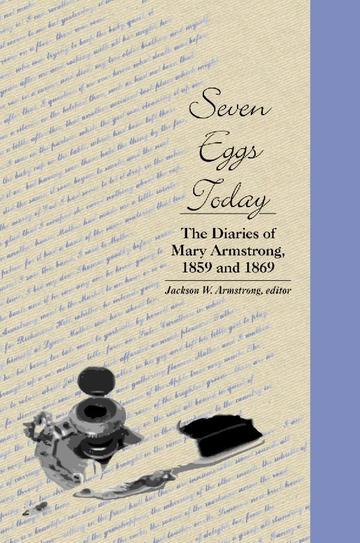Offers an intriguing glimpse into the daily life of an average Toronto woman in the mid-nineteenth century.
Mary Armstrong’s diaries are a window into the daily life of a middle-class woman in a new and changing land, and a revealing account of life in early Toronto just before and after confederation. Her journals are one of very few published by Canadian women, especially women outside the upper classes, in the decades surrounding the mid-nineteenth century.
Mary Armstrong was the wife of a butcher / farmer who lived in what is now the Yorkville and Deer Park area of Toronto from the 1830s to the 1880s. She had immigrated with her parents and siblings from England in 1834. Her diaries, which cover five months in 1859 and eight months in 1869, reflect her multiplicity of interests and concerns including family, women’s work, faith, status and class, occupation and trade, community networks, and local and national identity.
Jackson W. Armstrong’s introduction examines who Mary was, what her world was like, and how she saw her own place in it; it also explains the origin and history of the diaries. His extensive primary research supports the well-annotated diaries, and gives contextual information on the events, people, and places that Mary mentions.
Seven Eggs Today offers new information and a new perspective on mid-Victorian English Canada, and will be welcomed by general readers and scholars interested in colonial life, biography, immigrant experiences, family or local history, or women’s studies.
Jackson W. Armstrong grew up in Toronto and received his BA from Queen’s University. He has also studied at the University of Edinburgh, and he received his MPhil and PhD from the University of Cambridge. He is currently a lecturer in history at the University of Aberdeen.
Both text and commentary are a worthwhile contribution to the publisher's Life Writing series.
Seven Eggs Today: The Diaries of Mary Armstrong, 1859 and 1869 [is] a well-edited, well-researched treasure from Victorian Canada....These kinds of diaries are an often overlooked source of information about women's lives and labours....The editor thoughtfully includes seemingly unimportant household accounts in the published version....He leaves in gaps, stricken mistakes, odd punctuation, underlining; in short, he has done as much as he can to transmit in printed text the idiosyncratic presentation of the diary manuscripts...Armstrong...is adept at making [the diaries'] relevance clear in historical and literary contexts. It stands as a useful template to anyone else editing a nineteenth-century diary and offers its readers unusual insight into the life of a middle-class woman in mid-century Canada.
These accounts of a...woman's life in Toronto around the time of Confederation do provide insight into what a middle-class woman's life must have been like.
This explains the literary and historical significance of Seven Eggs Today. Jackson Armstrong's publication of his great-great-great grandmother's diaries from the years 1859 and 1869 provides a rare glimpse into the life of a middle-class woman living in Victorian-era Toronto around the time of Canada's Confederation. Armstrong has done an excellent job editing the diaries. While the value in such documents lies in their recital of everyday events ('two eggs yesterday, three today') and personal reflections ('Father is once more himself'), nonetheless such mundane items can provide a wealth of information concerning not only Mary's family background, and the history of the family, but also relevant issues such as the importance of social position and status within Victorian Canada, the role of women in the family and society, and the impact of faith and religion in colonial society. Nonetheless, it is Mary herself who holds the reader's attention as she tells her own story of life in the young colony in her own words, bringing to life a bygone era and society. This volume will be of interest not only to scholars, but also to general readers who are interested in discovering a new perspective on a historical period.
"Seven Eggs Today: The Diaries of Mary Armstrong, 1859 and 1869 [is] a well-edited, well-researched treasure from Victorian Canada....These kinds of diaries are an often overlooked source of information about women's lives and labours....The editor thoughtfully includes seemingly unimportant household accounts in the published version....He leaves in gaps, stricken mistakes, odd punctuation, underlining; in short, he has done as much as he can to transmit in printed text the idiosyncratic presentation of the diary manuscripts...Armstrong...is adept at making [the diaries'] relevance clear in historical and literary contexts. It stands as a useful template to anyone else editing a nineteenth-century diary and offers its readers unusual insight into the life of a middle-class woman in mid-century Canada."



